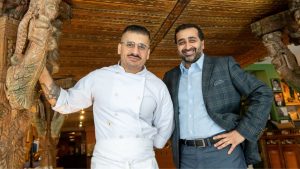The “Go Paperless” partnership between Hydro Ottawa and the Children’s Hospital of Eastern Ontario (CHEO) Foundation offers one of the most prominent and telling illustrations of corporate-charity partnerships in Canada’s capital.
It’s a story of like-minded entities with big presence combining to make a huge difference.
Now in its third year, this annual collaboration invites Hydro Ottawa customers to go paperless by signing up for online billing. Hydro Ottawa donates $5 to the CHEO Foundation for each new paperless customer.
OBJ360 (Sponsored)

Wonder and amazement is what you’ll discover at these Ottawa museums
This summer, embark on a journey where curiosity knows no bounds by stepping into the world of innovation and wonder at these Ottawa Museums.

Vegan? Halal? Gluten-free? This Ottawa restaurant has you covered
For food lovers who have dietary restrictions, it can often be a challenge to find a restaurant that checks all the boxes.
In this win-win-win scenario, Hydro Ottawa customers save time on billing, save trees by consuming less paper and help boost the size of the annual donation to CHEO. Hydro Ottawa benefits from a streamlined billing system and a reduced carbon footprint. CHEO, the end beneficiary, uses the donated funds to enhance its programs and acquire critical technologies such as new patient monitors, a paperless Echocardiography machine, and a portable X-ray machine.
“Go Paperless” has been a resounding success, generating 13,112 new online billing registrations in 2017 and 16,465 in 2018. The ongoing 2019 drive – called “Be a Paperless Hero” – ends Dec. 31 and those involved are confident of another big tally.
“Year after year, our customers continue to exceed our expectations,” says Bryce Conrad, Hydro Ottawa’s president and CEO. “Thanks to their decision to go paperless we’ve been able to support CHEO in the incredible work they do every day.”
For a highly visible entity such as Hydro Ottawa, community engagement and corporate social responsibility are high on the priority list – which makes a partnership with CHEO a near-perfect fit.
“The CHEO Foundation is a highly respected and well-known charitable organization,” says Conrad. “Their work aligns with our objectives of supporting youth and healthcare organizations in our community.”
“Our intention was to work with a different charity each year to keep the campaign fresh,” adds Conrad. “But given our excellent working relationship and unprecedented campaign results, we decided to continue working with CHEO.”
Jacqueline Belsito, vice-president of philanthropy and community engagement at the CHEO Foundation, agrees that the continuing success of the “Go Paperless” campaign is highly dependent on cultural fit between CHEO and Hydro Ottawa.
“Without donations, CHEO simply cannot buy the life-saving equipment or support the cutting-edge research that will change how we are able to treat our kids,” she says.
Thousands of square meals a day
The less-fortunate members of our community who have to worry about where their next meal might come from will be thankful for programs such as Mealshare – a non-profit social enterprise that began in western Canada in 2013 and took root in Ottawa three years later.
Mealshare acts as a highly popular link between civic-minded restaurateurs and local charities that feed the less advantaged. To date, the 70 local restaurants making donations have helped partner charities serve almost 240,000 meals.
Restaurants designate a Mealshare item on their menus and donate $1 each time the item is purchased. Mealshare forwards the donations to selected charities that translate each dollar into a meal. In Ottawa, Mealshare charities are Parkdale Food Centre, Boys and Girls Club of Ottawa, and Operation Come Home.
For community-minded restaurateurs such as Stephen Beckta, Mealshare is a great way to demonstrate a commitment to particular causes such as at-risk children and youth. All three of Beckta’s highly regarded restaurants – Beckta, Play and Gezellig – are Mealshare participants.
“It’s a great partnership,” says Beckta. “We believe that it aligns us with people in our orbit who share the same values and it reinforces their choice to work, do business or dine with us, all the while lifting up one of the most vulnerable areas of our community.”
Katie Hession, Ottawa’s community leader for Mealshare, says the initiative has been embraced by a wide range of Ottawa restaurants, many of which are motivated to make a significant impact.
“We encourage our restaurants to aim to provide at least 300 meals per month, which is our average,” says Hession. “We have extra-generous partners who choose their best-selling item as their Mealshare item – like the Heart & Crown, who chose their award-winning fish and chips that’s ordered more than 40,000 times per year.”
In addition to the feel-good factor associated with donating, restaurateurs benefit from a significant amount of promotion that Mealshare helps to generate.
“All of our restaurants are listed on our website under our ‘Find a Restaurant’ tool,” says Hession. “We are also very active on social media, where we post about our partners daily. In Ottawa, we have a Mealshare Bite Club featuring local influencers with a strong local following who share their dining experiences on Instagram.”
Hession adds that, much like Beckta, a good many restaurant owners see great value in showing commitment to social causes in a way that engages clientele.
“One of the main ways our program appeals to restaurants is that it involves the customer in their philanthropy,” says Hession. “Restaurants are able to improve their brand image because their generosity is at the forefront of their everyday operation.”





